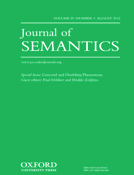
Journal of Semantics
Scope & Guideline
Connecting Language, Thought, and Technology.
Introduction
Aims and Scopes
- Theoretical Semantics:
The journal explores foundational theories of semantics, including the structure of meaning, reference, and the role of context in interpretation. - Experimental Semantics:
A significant focus is placed on experimental methodologies that assess semantic theories through empirical data, highlighting how speakers comprehend and produce meaning. - Cross-Linguistic Studies:
The journal often features research that compares semantic phenomena across different languages, contributing to a broader understanding of universal and language-specific aspects of meaning. - Pragmatics and Meaning:
Investigations into the interplay between semantics and pragmatics are central, especially how contextual factors influence meaning beyond literal interpretations. - Quantification and Modality:
Research on quantifiers, modality, and related concepts is a core area, examining how these elements shape the semantics of sentences. - Cognitive and Psychological Perspectives:
Some papers delve into cognitive aspects of semantics, exploring how individuals process and understand meaning, often through experimental psychology lenses.
Trending and Emerging
- Interplay of Semantics and Pragmatics:
There is an increasing emphasis on how semantic meaning interacts with pragmatic context, particularly in understanding implicatures and presuppositions. - Experimental Approaches to Meaning:
Recent publications showcase a trend towards experimental and empirical methodologies, providing data-driven insights into how semantics operates in real-world language use. - Generics and Contextual Meaning:
Research focusing on generics and their interpretation in varying contexts is gaining traction, highlighting the complexities of how generalizations function in language. - Causal and Probabilistic Semantics:
Emerging interest in the relationship between semantics and causal reasoning or probabilistic constraints reflects a broader trend towards integrating semantics with cognitive science. - Cross-Linguistic and Typological Research:
There is a notable increase in studies comparing semantic structures across languages, underscoring the importance of cross-linguistic insights in understanding universal semantic principles.
Declining or Waning
- Historical Semantics:
Papers that explore historical perspectives on semantic change have become less common, as contemporary research increasingly emphasizes current linguistic phenomena rather than historical developments. - Philosophical Semantics:
The intersection of semantics with philosophical inquiries, such as truth and reference theories, appears to be declining, possibly due to a growing focus on empirical studies. - Formal Semantics:
While formal approaches remain important, there is a noticeable reduction in the number of papers strictly adhering to formal semantic frameworks, as researchers explore more interdisciplinary and experimental methodologies. - Static vs. Dynamic Semantics:
Discussions focusing on the dichotomy between static and dynamic semantics are less frequent, perhaps indicating a shift towards more integrated approaches that blend these perspectives.
Similar Journals

Studia Semiotyczne
Pioneering Research at the Intersection of DisciplinesStudia Semiotyczne is a prominent academic journal dedicated to the interdisciplinary study of semiotics, linguistics, and philosophy, published by the esteemed Polskie Towarzystwo Semiotyczne. With its ISSN 0137-6608 and E-ISSN 2544-073X, this journal has established itself as an essential platform for scholars in these fields. Since transitioning to Open Access in 2010, Studia Semiotyczne provides unrestricted access to groundbreaking research, thereby fostering scholarly exchange and collaboration globally. The journal has been recognized in the Q2 category in both Linguistics and Language and Philosophy in 2023, reflecting its quality and impact in these disciplines. By covering a range of topics within semiotics and related studies, it aims to advance understanding and stimulate dialogue among researchers and practitioners alike, making it an indispensable resource for those seeking to explore the complexities of meaning and communication in contemporary society.

Journal of Comparative Germanic Linguistics
Elevating Understanding of Germanic Language StructuresThe Journal of Comparative Germanic Linguistics, published by SPRINGER, is a leading peer-reviewed academic journal that has significantly contributed to the fields of linguistics and arts and humanities since its inception. With an impressive impact factor and consistently ranked in the Q1 category in both Arts and Humanities (miscellaneous) and Linguistics and Language, this journal serves as a vital platform for scholars to disseminate their research on comparative studies in Germanic languages. The journal's scope encompasses a broad range of topics, fostering an interdisciplinary dialogue that enhances our understanding of language development, structure, and evolution. Although currently not an open-access journal, the Journal of Comparative Germanic Linguistics ensures that its high-quality articles reach a global audience, appealing to researchers, professionals, and students who are keen to explore the nuances of Germanic linguistics. With its strategic address in the Netherlands, the journal stands at the forefront of linguistic research, providing valuable insights that contribute to the academic community's knowledge base.

Snippets
Embracing diverse perspectives for a deeper understanding.Snippets is an esteemed academic journal published by LED EDIZIONI UNIV, known for its commitment to advancing knowledge across various disciplines. The journal, which carries the ISSN 1590-1807, serves as a crucial platform for researchers, professionals, and students in the fields of humanities, social sciences, and applied sciences. With an increasing emphasis on open-access content, Snippets offers a wealth of information and insights aimed at fostering academic dialogue and innovation. Although specific metrics like impact factor and H-index are yet to be established, the journal is dedicated to providing high-quality research outputs that contribute to the enrichment of scholarly pursuits. Based in Milan, Italy, Snippets welcomes contributions from a diverse range of perspectives, thus enhancing interdisciplinary collaboration and promoting a deeper understanding of contemporary issues.

Journal of Portuguese Linguistics
Navigating the Complexities of Portuguese LinguisticsThe Journal of Portuguese Linguistics is an esteemed peer-reviewed academic journal published by UBIQUITY PRESS LTD, dedicated to the exploration of the rich complexities of the Portuguese language and its various linguistic dimensions. With an ISSN of 1645-4537 and an E-ISSN of 2397-5563, this open-access journal has been disseminating valuable research since 2002, ensuring that knowledge is accessible to all scholars, professionals, and students interested in Linguistics. Based in Portugal, it features a distinct focus on the linguistics pertinent to the Portuguese language, facilitating discussions that span theoretical and applied interests. The journal holds a respectable Q3 quartile rank in the field of Linguistics and Language, reflecting its growing significance and contribution to academia, as evidenced by Scopus rankings that place it in the 71st and 68th percentiles in Arts and Humanities as well as Social Sciences. Researchers and practitioners alike will find Journal of Portuguese Linguistics to be an indispensable resource for fostering discourse and innovation in the study of language.
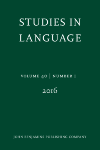
STUDIES IN LANGUAGE
Unveiling the Dynamics of Language and SocietySTUDIES IN LANGUAGE is a distinguished academic journal published by John Benjamins Publishing Co, focusing on the dynamic fields of Linguistics and Communication. With an ISBN of 0378-4177 and E-ISSN 1569-9978, this journal has become an essential platform for researchers, professionals, and students seeking to advance their understanding of language and its multifaceted dimensions. The journal has been recognized in 2023 with a prestigious Q1 categorization in Linguistics and Language and a Q2 ranking in Communication, reflecting its vital contributions to these fields. Its Scopus rankings further emphasize its relevance, ranking 299 out of 1088 in Language and Linguistics, positioning it within the 72nd percentile. Published continuously since its inception in 1977, STUDIES IN LANGUAGE plays a pivotal role in disseminating cutting-edge research and fostering academic dialogue around contemporary linguistic theories and communication practices. While it is not an open-access journal, it offers valuable insights that make it a must-read for anyone committed to exploring the intricate relationships between language, culture, and society.

Yuyan Kexue-Linguistic Sciences
Advancing Understanding in Linguistic SciencesYuyan Kexue-Linguistic Sciences, published by SCIENCE PRESS, is a pivotal academic journal dedicated to the field of linguistics. With its ISSN of 1671-9484, this journal seeks to explore and illuminate various linguistic phenomena, contributing significantly to the understanding of language in both theoretical and applied contexts. Emphasizing interdisciplinary research, it welcomes contributions that bridge linguistics with areas such as cognitive science, sociology, and communication studies. Although it currently does not offer open access, Yuyan Kexue-Linguistic Sciences aims to provide a platform for researchers, professionals, and students alike to engage with cutting-edge studies and emerging trends in linguistics. Its publication location in Beijing positions it as a vital contributor to the global discourse in the linguistic sciences, catering to both a national and international audience. As the journal continues to grow, it aspires to maintain high academic standards and foster scholarly exchange for years to come.

Voprosy Yazykoznaniya
Navigating the Intricacies of Linguistic ScholarshipVoprosy Yazykoznaniya, published by the esteemed Russian Academy of Sciences and the State Academy of Humanities (GAUGN), stands as a leading journal in the field of linguistics and language studies. With an impressive Q2 rank in Linguistics and Language for 2023 and a strong position within Scopus rankings, this journal fosters scholarly dialogue and pushes the boundaries of linguistic research by providing a platform for innovative studies, reviews, and analyses. Although not open access, its publication ensures high academic standards and visibility within the global academic community. Researchers, professionals, and students alike can benefit from the rich insights and diverse perspectives presented in this journal, serving as a vital resource for anyone interested in the intricacies of language and its role in society. Operating since 2009 and continuing to 2024, Voprosy Yazykoznaniya is an essential reference point for contemporary linguistic scholarship in the Russian Federation and beyond.
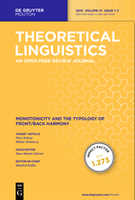
THEORETICAL LINGUISTICS
Charting New Territories in Theoretical LinguisticsTHEORETICAL LINGUISTICS, published by Walter de Gruyter GmbH, is a prominent journal dedicated to exploring the intricate dimensions of linguistics, positioning itself as an essential resource for scholars and practitioners in the field. Established in 1974, this Germany-based journal has undergone significant evolution, contributing to the theoretical and empirical understanding of language with a focus on diverse linguistic phenomena. As evidenced by its Q2 ranking in the Linguistics and Language category for 2023, THEORETICAL LINGUISTICS engages with innovative theoretical discussions and methodologies, making it a vital platform for researchers navigating the complexities of language structure and usage. Though not an open-access journal, it ensures accessibility through robust distribution networks, fostering collaboration and knowledge-sharing within the academic community. With a consistent output from 1990 to 2024, this journal stands at the intersection of linguistics and language studies, appealing to a wide audience of researchers, professionals, and students alike.
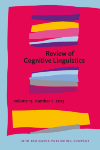
Review of Cognitive Linguistics
Disseminating Knowledge at the Forefront of Linguistic ResearchThe Review of Cognitive Linguistics, published by John Benjamins Publishing Co, is a premier academic journal dedicated to the exploration of cognitive approaches to linguistics. With an ISSN of 1877-9751 and E-ISSN 1877-976X, this journal provides a critical platform for researchers and professionals to disseminate their findings in the rapidly evolving fields of linguistics and language, alongside developmental and educational psychology. Hailing from the Netherlands, the journal boasts impressive standing within the academic community, as indicated by its 2023 Q1 ranking in Linguistics and Language and Q3 in Developmental and Educational Psychology. Additionally, its Scopus rankings reflect a strong position within the arts and humanities and social sciences categories. While currently operating under a traditional access model, this journal actively contributes to the overarching discourse within cognitive linguistics, and is a vital resource for those aiming to deepen their understanding of the intricate link between language and cognition. Researchers, educators, and students are encouraged to engage with the rich body of articles spanning its convergence years from 2010 to 2024, making it an essential read for those at the forefront of these interdisciplinary studies.
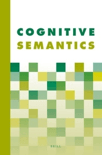
Cognitive Semantics
Diving Deep into the Semantics of ThoughtCognitive Semantics, published by BRILL, is a leading academic journal dedicated to the intricate study of cognitive processes underlying language use and semantic meaning. With its ISSN 2352-6408 and E-ISSN 2352-6416, this journal contributes significantly to the fields of linguistics and language studies, reflecting its importance in contemporary research on cognitive linguistics. Over its publication span from 2015 to 2024, it has established a niche as a Q3 ranked journal in the Linguistics and Language category for 2023, showcasing its relevance and growing influence in the academic community. Although currently not open access, the journal aims to provide a robust platform for exchanging ideas, theories, and methodologies related to cognitive semantics, fostering interdisciplinary dialogue among researchers, professionals, and students. Readers can expect to uncover valuable insights into the cognitive mechanisms that shape our understanding of language, making this journal an essential resource for anyone involved in linguistic research.